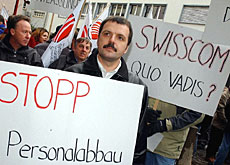Cabinet challenges Swisscom’s “last mile” monopoly

The Swiss cabinet has called for the opening up of the "last mile" of fixed line telephone connections as soon as possible.
The government wants to end Swisscom’s dominance of the market, but it could take years to come into effect.
Swisscom, in which the government has a majority stake, still has the monopoly on the fixed line network in Switzerland. Consumers currently have to pay the company a monthly fee for the use of its network, even if they are not Swisscom customers.
The communications minister, Moritz Leuenberger, said that although the Swiss telecommunications market was still growing, the pace of that growth had slowed in recent years.
“The government has a responsibility to encourage growth in the telecommunications market while protecting consumers,” he told a press conference after Wednesday’s weekly cabinet meeting.
“A rapid opening up of the last mile is of benefit for everyone – big business, small and medium sized enterprises and the consumer,” he added.
Dual approach
The government has chosen a twofold strategy to liberalise home connections.
It has issued a new directive recommending the freeing up of the fixed line market as soon as possible. It has also handed over the decision of opening up the last mile to parliament, which is currently discussing revision of the existing telecommunications law.
The new directive will come into force on April 1, allowing the government to push through reform more quickly should parliament vote to incorporate the recommendations in the new law.
The government has chosen the dual approach because parliament has to be consulted and relying solely on the directive would make it harder to counter the legal challenges that it expects to come from Swisscom.
“Parliament could have taken this whole question into its own hands anyway,” Marc Furrer, director of the federal communications office, told swissinfo.
“In this way if parliament approves [opening up the last mile] there’ll be a directive in place to go ahead with it as soon as possible.
“If Swisscom and its competitors can agree on a format and pricing, we could have complete liberalisation by the end of this year.”
But Furrer admits that the process is likely to take a lot longer and a more realistic date for complete liberalisation is January 1, 2005.
Legal challenge
Swisscom has repeatedly said it will try to maintain its hold on the country’s fixed line network. A company spokeswoman, Pia Colombo, confirmed that Swisscom would be prepared to mount a legal challenge to any change in the law.
“We regret the [government’s] decision because we don’t think it’s a fair one,” she told swissinfo.
“As we have said before, we will go to the federal courts against the decision.”
Furrer says the government expects a legal challenge at some point – especially as that has been the pattern of telecommunications liberalisation throughout Europe, as former state monopolies have been opened up to competition.
While a challenge would delay the opening up of the last mile, Furrer maintains increased competition will have enormous benefits.
“We want more competition in the broadband sector because it’s a very important one for economic recovery,” he said.
“And because there will be more competition there will also hopefully be lower prices and that means that the consumer will profit a lot from the government’s decision.”
swissinfo, Jonathan Summerton
Swisscom made a profit of SFr12 billion in the first four years since liberalisation.
Swisscom dominates the fixed line market in Switzerland with 47 per cent of international calls, 64 per cent of national calls and 80 per cent of local calls.
The government’s new directive comes into force on April 1, 2003.
Full liberalisation, after a legal challenge, is expected by January 1, 2005.

In compliance with the JTI standards
More: SWI swissinfo.ch certified by the Journalism Trust Initiative










You can find an overview of ongoing debates with our journalists here . Please join us!
If you want to start a conversation about a topic raised in this article or want to report factual errors, email us at english@swissinfo.ch.